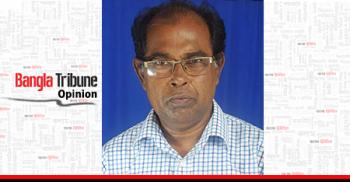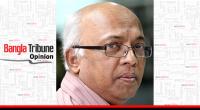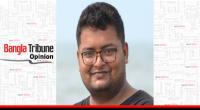 Bangladesh has a system of education which is the conglomeration of several levels- viz primary level, secondary level and tertiary level. The secondary level is intermediary and preparatory to the tertiary level which is the highest level. Now, which level is the lowest and which is the highest in importance is debatable. Here some light may be thrown on the drawbacks of our existing secondary level education for our present purposes.
Bangladesh has a system of education which is the conglomeration of several levels- viz primary level, secondary level and tertiary level. The secondary level is intermediary and preparatory to the tertiary level which is the highest level. Now, which level is the lowest and which is the highest in importance is debatable. Here some light may be thrown on the drawbacks of our existing secondary level education for our present purposes.
Being committed to meeting the educational needs of the present, our teachers serving in the secondary level ought to be modernists instead of traditionalists. Yet with few exceptions, most teachers are delinked from modern methods. For example, most teachers have poor or zero knowledge about computer matters without which the existing education system can’t exist. Along with the teachers, the accountability for this unfortunate situation can justifiably be laid on the government since it is the duty of the government to arrange for computer training and related matters for the teachers. But the government's help has been very meagre in this respect.
Secondary level institutes are categorised as government high schools, MPO enlisted high schools and non-MPO high schools. Despite minor problems, govt. high schools are well-regulated ones with patronisation from the Govt.’s side. But the scenarios for the MPO enlisted and non-MPO institutes are contrasting. Such is the salary structure of the MPO enlisted teachers, a teacher AT the initial stage of his professional career gets a poor salary of Tk 1,600 and one who is about to resign gets no more than Tk 22,000. Their house rent is a fixed sum of Tk 500 whereas all kinds of employees including NGO workers enjoy a hefty amount of house rent which is 30 percent, 40 percent, 50 percent or even more than 60 percent of their basic in some specified sectors. Teachers being deprived of the fundamental facilities, never think of the ancillary facilities- such as rest and recreation allowance, Boishaki allowance and the holistic payment of the two Eid bonuses. Can a high school teacher maintain even a nuclear family let alone an extended one with such wages? -is a question that must be brought to the attention of the nation. If better remuneration is the pre-condition of better service, then how can the nation expect good service from our underfed or underprivileged high school teachers?
Among those who have been victimised in the worst manner in this situation are non-MPO teachers numbering 80,000, employed in 5,242 non-MPO institutes (including colleges). Though hungry as well as underpaid, these teachers have been continuing working for around a decade not knowing when their tragedy will end. Their repeated requests for inclusion into the MPO have every time fallen on government’s deaf ears, which has neglected our education, as well as our human right. Standard teaching by this neglected manpower is no doubt an expectation that can never be fulfilled.
Outworn, haggard and invalid. Teachers’ post retired lives plunge into the unspeakable difficulties which spring from their not receiving the retirement benefits in due time. Owing to the red tape of official procedures retired teachers have to pass 5 or 6 years before they receive their due benefits as the last prop of their lives. The recruitment system prevalent in this phase of education is absolutely a bar discouraging all qualified and meritorious persons from joining the teaching profession. Different varieties of anomalies, nepotism, partiality and so on attract only the dull-headed to enter this profession and merit gets discounted.
The govt.’s ministry running the education sector of the country has much to do with the development as well as the degeneration of education. So, its lapses matter much. Regrettably, its whimsical changes of syllabus plus curricula too often hamper the smooth run of the secondary level education by embarrassing students and teachers alike. Moreover, our secondary education has turned quantitative rather than qualitative in character. At present, we observe a new trend of over-leniency and excessive liberality in the teachers’ side in evaluating the answer-scripts of the examinees. Unusually high passing out rate through over-marking is its consequential phenomenon the nation faces. Our guardians and students tend to secure certificates, but not true knowledge which will help expand their mind. Nor do they hesitate to resort to unfair means in attaining these certificates. Therefore, our secondary education is faced with colossal distortions, which could cost the nation in the future.
Our learners in secondary level pass through their adolescence, which is generally best-suited to shape them in any form because mental flexibility is the predominant characteristic of this age. In a word, the education they attain in this phase has a long-lasting effect on the later part of their lives. For these reasons, education at this stage must be prioritised. The government teachers and guardians should appreciate the importance of this learning and unanimously must overcome all negatives; otherwise, our today’s adolescent learners cannot serve the country in their adulthood.
Emdadul Haque is a lecturer in the department English in Maheshpur Govt. College, Maheshpur, Jhenidah.
 Opinion
Opinion
41388 hour(s) 3 minute(s) ago ;
Morning 06:57 ; Monday ; Jul 07, 2025
Problems with our secondary level education
Send
Emdadul Haque
Published : 20:23, Dec 10, 2018 | Updated : 17:53, Feb 06, 2019
Published : 20:23, Dec 10, 2018 | Updated : 17:53, Feb 06, 2019
0 ...0 ...
/hb/
Topics: Emdadul Haque
***The opinions, beliefs and viewpoints expressed in this article are those of the author and do not reflect the opinions and views of Bangla Tribune.
- KOICA donates medical supplies to BSMMU
- 5 more flights to take back British nationals to London
- Covid19: Rajarbagh, Mohammadpur worst affected
- Momen joins UN solidarity song over COVID-19 combat
- Covid-19: OIC to hold special meeting
- WFP begins food distribution in Cox’s Bazar
- WFP begins food distribution in Cox’s Bazar
- 290 return home to Australia
- Third charter flight for US citizens to return home
- Dhaka proposes to postpone D8 Summit
Unauthorized use of news, image, information, etc published by Bangla Tribune is punishable by copyright law. Appropriate legal steps will be taken by the management against any person or body that infringes those laws.
Bangla Tribune is one of the most revered online newspapers in Bangladesh, due to its reputation of neutral coverage and incisive analysis.
F R Tower, 8/C Panthapath, Shukrabad, Dhaka-1207 | Phone: 58151324; 58151326, Fax: 58151329 | Mob: 01730794527, 01730794528


